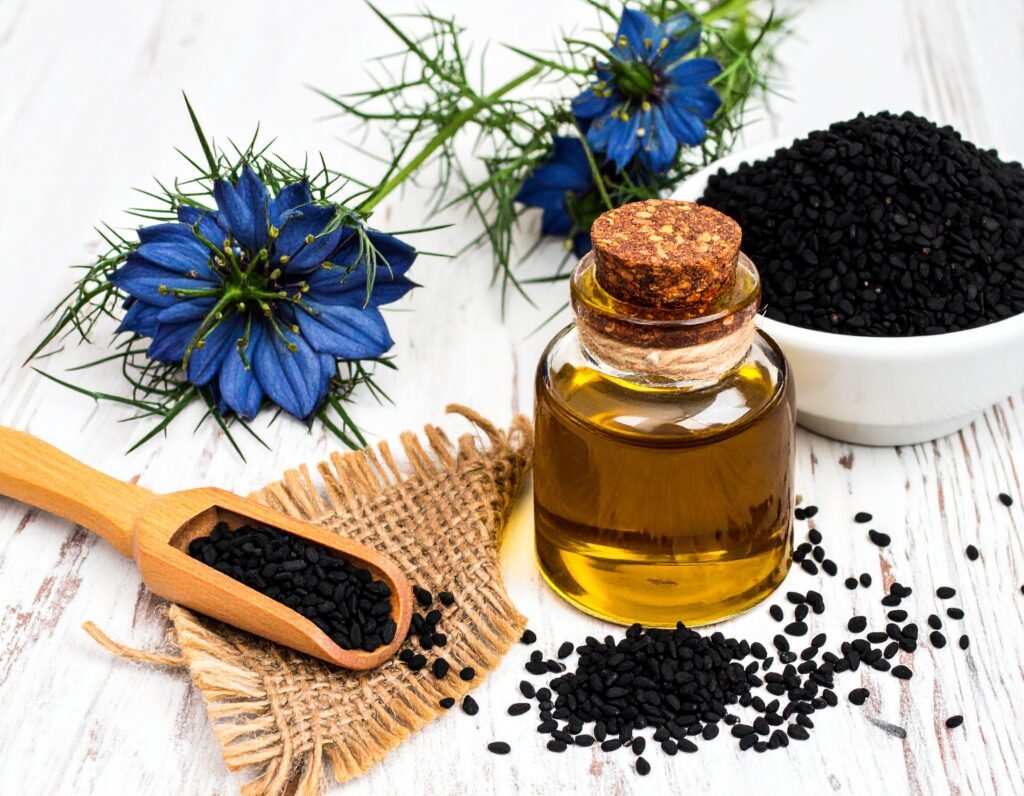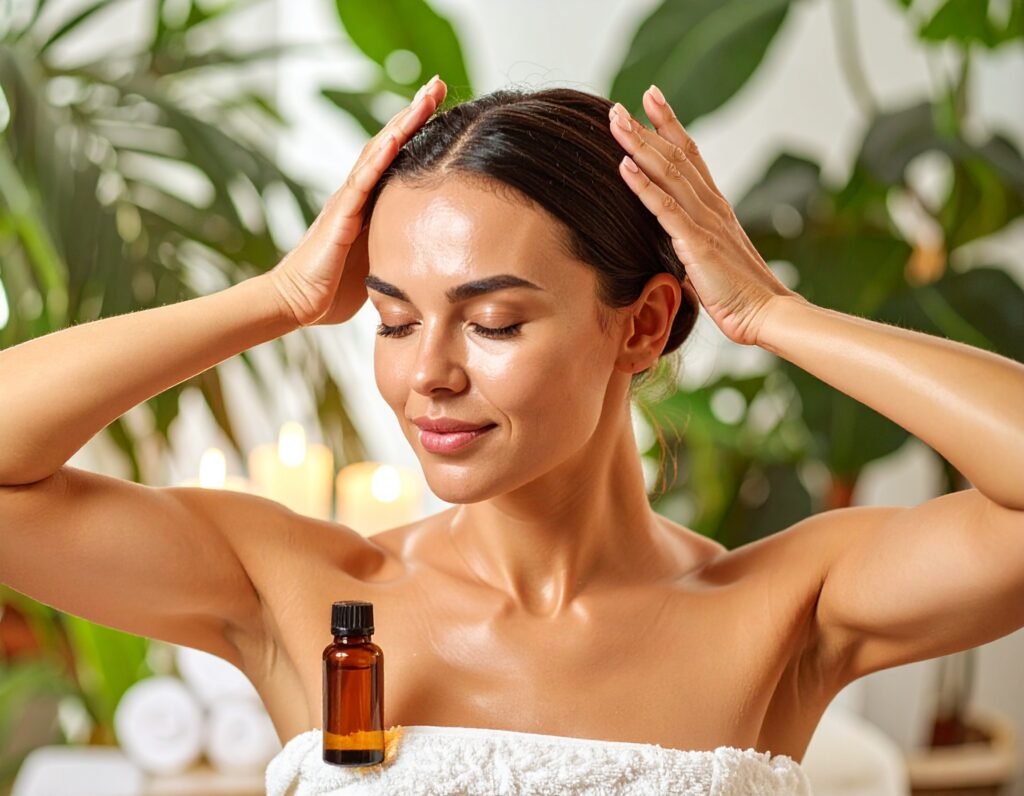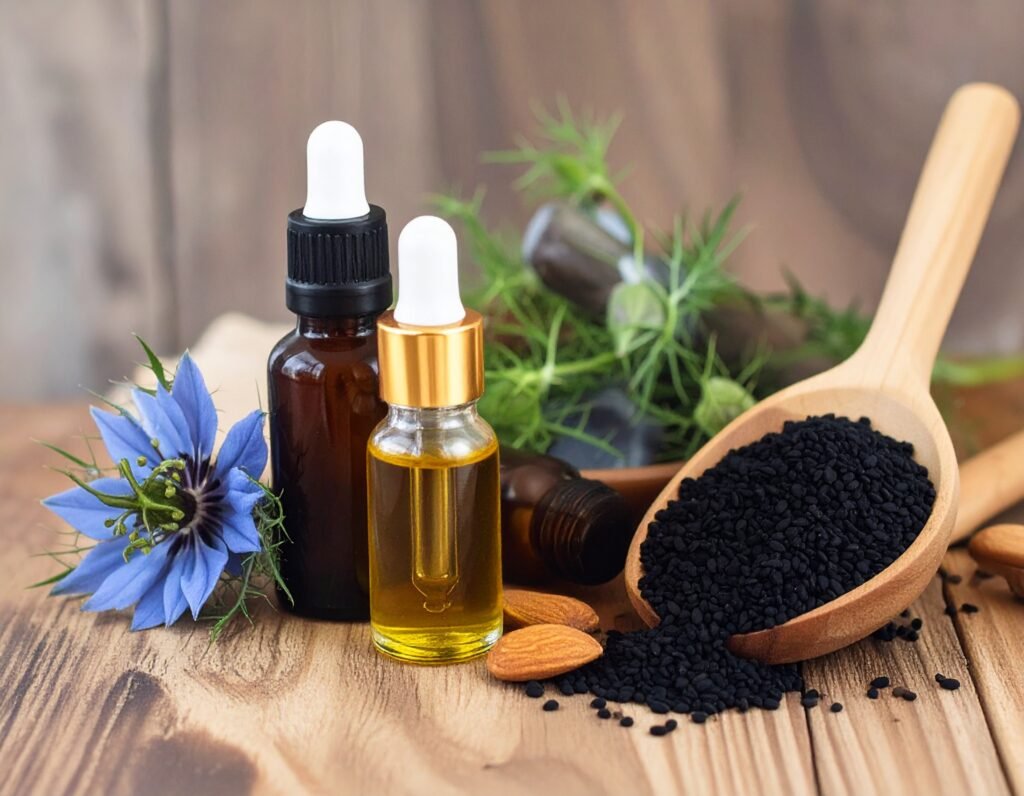Black Seed Oil for Hair Growth & Scalp Health: Ancient Remedy Reimagined

Hair and Scalp Growth Pack
Get our exclusive guide: step-by-step recipes for scalp serums, herbal rinses, and black seed oil rituals for healthy hair—free to Health Intel Daily readers.
Download NowTruVarin: Enriched Formula for Hair Strength & Growth
- Supports hair regrowth and reduces thinning or scalp discomfort
- Targets root causes of weak, brittle, or shedding hair
- Formulated for men and women struggling with hair loss


Revered for centuries and even called “the remedy for everything but death,” black seed oil (Nigella sativa) is more than just folklore—it’s a powerful elixir for hair and scalp health. Rich in nutrients and antioxidants, this ancient oil calms inflammation, stimulates hair growth, and even helps combat stubborn scalp issues like dandruff or itchiness. Let’s dive into the science, the rituals, and how you can use it yourself at home.
Why Black Seed Oil? From Prophetic Healing to Haircare Hero
Black seed oil (Nigella sativa), often called the “seed of blessing,” has been cherished for over 2,000 years across the Middle East, North Africa, and South Asia. Revered in prophetic traditions and ancient herbal texts, it was once described as a remedy for “everything but death.” Today, this golden-black elixir continues to earn its reputation as a powerful natural healer for both inner wellness and outer beauty—especially when it comes to restoring hair strength and vitality.
A Legacy of Healing
In traditional medicine systems such as Ayurveda, Unani, and Islamic medicine, black seed oil has long been used to support immunity, digestion, skin, and respiratory health. Its enduring popularity comes from its unique combination of antioxidants and nutrients that nourish the body at the cellular level. Over time, modern research has confirmed what ancient healers knew—black seed oil’s key compound, thymoquinone, offers broad-spectrum benefits for inflammation, microbial balance, and tissue repair.
From Remedy to Haircare Hero
When used topically, black seed oil works wonders on the scalp and hair. It soothes irritation, balances excess oil, and strengthens follicles from root to tip. Regular use can help reduce shedding, improve scalp circulation, and encourage thicker, shinier strands. Its naturally antimicrobial and anti-inflammatory nature makes it especially beneficial for those with dandruff, dryness, or scalp sensitivity.
Active Compound Spotlight
- Thymoquinone: The star compound in black seed oil—rich in antioxidants that protect hair follicles from oxidative stress and inflammation, helping prevent premature thinning.
- Omega-3 & Omega-6 Fatty Acids: Deeply nourish the scalp, enhance hydration, and strengthen the hair shaft for softness and resilience.
- Vitamins B & E: Support cell renewal and microcirculation, promoting a healthy environment for new growth.
Together, these nutrients create a powerful natural synergy—feeding the scalp, reducing breakage, and helping restore fuller, healthier hair. Whether massaged directly into the scalp or blended into DIY treatments, black seed oil bridges the wisdom of ancient healing with modern self-care.
Quick Tip: Combine black seed oil with rosemary or castor oil for a potent weekly scalp massage that enhances circulation, strengthens roots, and promotes long-term growth.
TruVarin: Varin-Rich Hemp, Saw Palmetto & Green Tea
- Features varin-rich hemp oil, peppermint, saw palmetto, green tea, caffeine
- All-natural actives for scalp support and fuller-looking hair
- Free from harsh chemicals—gentle on scalp and hair roots


DIY Black Seed Oil Scalp Treatment
Black seed oil (Nigella sativa) is a centuries-old beauty remedy renowned for its ability to nourish the scalp, strengthen hair follicles, and promote healthy growth. Rich in thymoquinone, antioxidants, and essential fatty acids, it helps reduce dandruff, soothe irritation, and restore shine to tired strands. This simple at-home scalp treatment blends black seed oil with complementary oils for a truly revitalizing ritual.
Revitalizing Scalp Massage Oil
Ingredients:
- 1 tbsp black seed oil (cold-pressed, unrefined)
- 1 tbsp castor oil or jojoba oil (as a carrier oil)
- Optional: 5 drops peppermint or rosemary essential oil for stimulation and freshness
Instructions:
- In a small glass bottle or bowl, mix all oils thoroughly.
- Warm the blend gently between your hands or by placing the bottle in a bowl of warm water for a few minutes.
- Massage into the scalp using circular motions for 5–10 minutes to boost circulation and absorption.
- Leave on for 30 minutes to overnight, depending on your schedule and hair type.
- Wash thoroughly with a gentle shampoo and allow hair to air-dry if possible.
Pro Tip: Use this treatment 1–2 times a week for best results. Regular use helps improve scalp health, reduce shedding, and enhance natural shine and volume.
Variation: For dry or frizzy hair, add a few drops of argan or coconut oil for extra nourishment. For oily or dandruff-prone scalps, add a teaspoon of aloe vera gel to soothe and balance.


Additional DIY Remedies & Pro Tips
Beyond the classic scalp massage, black seed oil can be incorporated into your beauty and wellness routine in several nourishing ways. These simple, natural recipes support hair strength, scalp balance, and overall vitality—inside and out.
Leave-In Hair Serum
Ingredients:
½ tsp black seed oil
2 tbsp aloe vera gel
How to Use:
Mix until smooth and apply a small amount to hair ends or dry scalp patches. This lightweight serum hydrates, smooths frizz, and seals split ends. Use 2–3 times a week on damp or dry hair.
Internal Tonic for Hair & Immunity
Ingredients:
1 tsp black seed oil
1 tsp honey
1 cup warm water or herbal tea
How to Use:
Stir the ingredients together and drink in the morning on an empty stomach. This tonic helps nourish hair from within, strengthen immunity, and support clear skin. Consult your healthcare provider before use if pregnant or taking medications.
Scalp Mask for Flakes
Ingredients:
1 tbsp black seed oil
2 tbsp bentonite clay
¼ cup nettle tea (cooled)
How to Use:
Combine ingredients to form a creamy paste. Apply evenly to the scalp and leave on for 20 minutes. Rinse thoroughly and follow with a mild shampoo. This detoxifying mask helps remove buildup, balance oil, and calm irritation.
Pro Tips for Best Results
- Patch test first: Black seed oil is potent; always test a small area before full use.
- Blend with lighter oils like jojoba or almond for daily application or fine hair types.
- Be consistent: Visible results—such as reduced shedding, shinier hair, and improved scalp health—typically appear after 4–6 weeks of regular use.
- Store properly: Keep black seed oil in a dark glass bottle, away from sunlight, to preserve potency and freshness.
Quick Tip: Combine black seed oil with rosemary, fenugreek, or amla in DIY blends for a synergistic boost in hair growth and scalp nourishment.
Best Black Seed Oil for Hair Growth
Cold-pressed, organic, non-GMO. Choose a top-rated black seed oil to maximize benefits for scalp and hair.
Buy Premium Black Seed Oil at AmazonWe may earn from qualifying purchases.

Black seed oil was found in King Tut’s tomb.
Want a Legendary Haircare Ritual?
Start with black seed oil. Download our “Ultimate DIY Herbal Haircare Guide” (PDF) and get weekly tips for scalp healing, natural beauty, and trusted product picks. Subscribe
One Comment